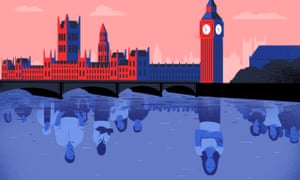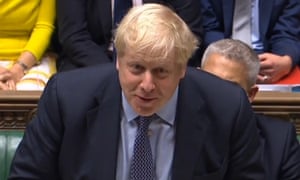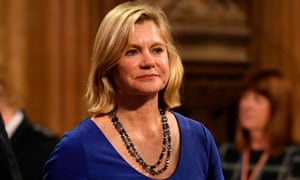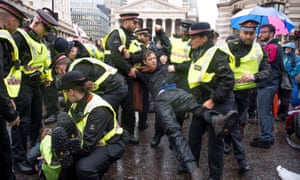British people are fundamentally disempowered by our political system. Other countries show that there’s another way writes George Monbiot in The Guardian

Illustration: Sebastien Thibault
They promised sovereignty, but at first it was unclear which variety of sovereignty they meant. Were the politicians who swore we would regain it when we left the European Union referring to parliamentary or popular sovereignty? Now we know they didn’t mean parliamentary sovereignty. Boris Johnson’s government has sought to trick, rush, ignore and prorogue parliament at every turn.
“People v parliament” is Johnson’s pitch to the nation. So where do the people come in? If he is a champion of popular sovereignty, why does he propose no improvements to a 19th-century model of democracy that permits no popular engagement other than an election every few years, and a referendum every few decades? There is a tension between parliamentary and popular sovereignty. A lively, meaningful democracy would achieve a balance between the two. It would combine parliamentary (representative) democracy with participatory democracy. But no such balance is sought.
Rather than encouraging an informed, nuanced politics, Brexit has made our system even more adversarial
Representative democracy is a remarkably blunt instrument. Hundreds of issues are bundled together at every election, yet the vote tends to swing on just one or two of them. The government then presumes consent for its entire programme and, if it commands a parliamentary majority, for anything else it wants to introduce in its term of office. We don’t accept presumed consent in sex. Why should we accept it in politics?
I’ve often been asked, when I complain about a government policy, “So why don’t you stand for election?” This suggests that the only valid political role a citizen can play is to become a representative, so that only a tiny proportion of the population has a legitimate voice between elections. This is the shallowest and weakest conception of democracy.
I do not want to abandon representative democracy. I want to see it balanced by popular sovereignty, especially the variety known as deliberative democracy. By contrast to the adversarial nature of representative democracy, in which politicians try to dominate and vanquish their opponents, deliberative democracy means drawing citizens together to solve problems. It means creating forums in which we listen respectfully to each other, seek to understand each other’s views, change our minds when necessary, and create the rich, informed democratic culture currently missing from national life.
Perhaps the best example is the participatory budgeting programme in the Brazilian city of Porto Alegre. Between 1989 and 2004, citizens were able to decide how the city’s entire investment budget should be spent. The process was designed by government and people working together, and was allowed to evolve as citizens suggested improvements. Some 50,000 people a year participated.
Instead of being captured by corrupt politicians and local mafias, the people’s decisions ensured that the money went where it was needed most, greatly improving sanitation, clean water, green space, health and education, transforming the lives of the poor. Porto Alegre became the Brazilian state capital with the highest ranking on the human development index. The more people engaged, the wider and deeper their political understanding became. Short-termism was replaced by long-term thinking: essential if we are to confront environmental breakdown.
There are plenty of other ways in which deliberative democracy can change our lives. In Ireland, a citizens’ assembly on abortion law turned an angry debate into a considered one. It tested competing claims and ideas, and led eventually to a referendum. The Better Reykjavík programme allows the citizens of Iceland’s capital to put forward ideas for the city’s improvement, which other people vote on. The 15 most popular ideas every month are passed to the city council to consider. The programme has remodelled Reykjavík in fascinating ways.
Constitutional conventions can be used to draw up principles of government, on which the rest of the population can then vote. Some of the best models are those developed by the Canadian provinces of British Columbia and Ontario. Members of the convention are drawn by lot and informed by experts, field trips and submissions from other citizens. The UK is in urgent need of one.
But for all the rhetoric about the people’s will, nothing of the kind is on offer in Britain. The so-called citizens’ assembly on climate change proposed by parliament is a cynical caricature of participation. It has a restrictive agenda, a narrow range of advisers and no time for effective deliberation. Digital tools offer massive opportunities for fine-tuning political decisions, but our cod-medieval system – all Black Rods and serjeants at arms – is stuck in the age of the quill pen. The only new form of participation we have been granted this century is an enhanced right to petition parliament, introduced by Tony Blair in 2006. Did it seem radical and innovative? Only until you remember that a similar concession appears to have been made by Edward I in 1275.
The European referendum, that apparently represents the people’s will, was reduced to such a crude choice that no one knows exactly what the majority voted for. Rather than encouraging an informed, nuanced politics, it has made our system even more adversarial, binary and reductive.
I could see the point of Brexit if it meant returning power to the people. But Johnson is as contemptuous of popular sovereignty as he is of parliamentary sovereignty. He seeks sovereignty of a different kind: autocratic control over both parliament and people.
I would love to see Labour placing radical democratic reform at the heart of its manifesto, seeking not to take power but to give it away. I suspect its offer will be limited, until we can build movements big enough to force our governments to let the people speak. Participation in politics is a not a gift. It is our right.
MPs rightly resisted an attempt to bounce them into blindly rubberstamping his deal writes Andrew Rawnsley in The Guardian

‘After his defeat he fixed a smile to his face and spoke as if “nothing has changed”.’ Photograph: -/PRU/AFP via Getty Images
Everything that could be done had been done to secure a victory for Boris Johnson on what had been billed as “Super Saturday”. He had come back from Brussels with his so-called “new deal” to the sound of the massed brass bands of the pro-Brexit media trumpeting praise for a “stunning achievement”/“personal triumph”/insert more sycophantic hyperbole here. Some European leaders tried to help him frame the choice before parliament as “new deal or no deal”. Suggestions that the EU might not grant another extension to the withdrawal date were designed to spook MPs into voting yes for fear of hurling Britain into a crash-out Brexit.
Cabinet ministers were deployed to “man-mark” any Conservative MP whose vote was doubtful. Heavy-breathing Tory whips said they were going to get “medieval” with rebels. The self-styled Tory Spartans, who would have spat out the Johnson deal as treachery if it had been presented by Theresa May, had fallen into line. Some of them had begun to see the ridiculousness of being Brexiters who never actually vote for Brexit.
Then there was the timetabling. To further ratchet up the pressure, the government staged the crackling drama of an “emergency” Saturday sitting of parliament, the first time that MPs had met at the weekend for nearly 40 years. This meant that everyone had an absurdly limited amount of time to get their heads around the latest tortuous iteration of Brexit. Concluding yesterday’s debate on behalf of the government, Michael Gove declared: “Our democracy is precious and this parliament is a special place.” They had a funny way of showing this supposed reverence for democracy and parliament. MPs were being asked to make a decision with huge consequences less than 48 hours after the deal had been unveiled. Were you able to conduct a confidential survey, guaranteeing to parliamentarians that their responses would remain anonymous, it is my strong suspicion that well under half of them have actually read the legal text and the rewritten political declaration. The government’s desperation to stampede parliament into signing off on the deal was further illustrated by its point-blank refusal to publish any analysis of its economic impact.

FacebookTwitterPinterest Oliver Letwin greets supporters in Whitehall after his amendment succeeded in the Commons. Photograph: Simon Dawson/Reuters
These tactics ultimately backfired. There was too much resistance to the attempt to bounce MPs into agreement. The debate was peppered with complaints that a prime minister who couldn’t be trusted was seeking a blank cheque from a parliament being kept in the dark. Justine Greening, the former Tory cabinet minister, tellingly complained that this was like being asked to buy a house without being allowed to see it.
By 322 to 306, a 16-vote defeat for Boris Johnson, MPs thwarted him by backing Sir Oliver Letwin’s amendment to withhold approval of the deal until MPs have had the chance to properly scrutinise the withdrawal legislation. For the prime minister, so-called Super Saturday turned into Squelched Saturday.
To understand why he was defeated, you first have to consider his deal. It bears no resemblance to the have-your-cake-and-eat-it promises peddled to the country by him and his fellow travellers during the referendum campaign in 2016. He succeeded in getting rid of the “backstop”, the element of the old deal so aggravating to the Tory Brexit ultras, but at the cost of inserting a frontstop that will keep Northern Ireland largely aligned with the single market and customs union for at least five years. The creation of an economic border down the Irish Sea made it impossible for him to gain the support of the Democratic Unionists. The other major difference with Mrs May’s deal is that it envisages moving to a much more distant relationship with Britain’s most important trading partners. The Johnson deal is one of the rock-hardest forms of Brexit. That diminished his chances of attracting support from Labour MPs.
In his speech to the Commons yesterday, the Tory leader said it was time to “move on”, a mantra parroted ad nauseam from the benches behind him. But as some of the more clued-up MPs observed, his deal does not “get Brexit done” at all. It covers only the divorce and a period of “transition”. Where Britain ultimately lands is still hugely uncertain. It is merely the prelude to a tougher stretch of bargaining about the terms of trade, customs, tariffs and standards with the EU. These negotiations come with another deadline attached. The cliff edge moves to the end of 2020. Caroline Lucas, the Green MP, put it wittily when she remarked that it was “a bad deal with a backdoor to a no deal.”

FacebookTwitterPinterest ‘Justine Greening, the former Tory cabinet minister, tellingly complained that this was like being asked to buy a house without being allowed to see it.’ Photograph: Daniel Leal-Olivas/AFP via Getty Images
The fundamental trouble with this deal is the same as with all the many versions of Brexit floated by two Tory prime minsters over the past three-plus years. None offers terms as favourable to the United Kingdom as remaining within the European Union. A study by the UK in a Changing Europe thinktank projects that the Johnson deal will shave up to 7% from the per capita income of Britons over a decade. Other forecasts are available. None of the credible ones suggests that Britain will be better off outside the EU.
There were other reasons why Mr Johnson could not assemble the coalition of support that he needed. The 10 votes of the Democratic Unionists played a decisive role in his defeat. They radiated the fury of people betrayed. Mr Johnson attended their party conference last year to pledge that “no British Conservative government could or should sign up to” regulatory checks and customs controls between Northern Ireland and the rest of the UK. Now he is pushing a deal that does this very thing.
Without the DUP, it was always going to be a very hard scrabble for the government to command a majority in the Commons. Its hopes depended on convincing enough Labour MPs to vote with the Tories. There is a band of Labour MPs who have their reasons for wanting to “get Brexit done”, but most had even more compelling reasons for not helping Mr Johnson to do it. He gave them less incentive to support him and more reason to distrust him by moving assurances on workers’ rights and environmental standards out of the binding withdrawal agreement and into the non-binding political declaration. His behaviour in his 88 febrile days as prime minister made it yet harder for Labour MPs to lend him their support.
The unlawful prorogation of parliament and the use of incendiary language to attack parliamentarians alienated some of the very Labour MPs he needed to persuade. The fact that it was a Johnson deal was a very big problem for them. The intense loathing he arouses among Labour people is much more visceral than their feelings about Theresa May. It is a very big step for a Labour MP to enable a Tory prime minister, especially when an election is looming. When that Tory prime minister is Boris Johnson, it proved just too much.
'Those hoping to take the question back to the people have more time to convince parliament to embrace a fresh referendum.
In response to his defeat, the prime minister rose to the dispatch box, fixed a smile to his face and spoke as if, to use a phrase made notorious by his predecessor, “nothing has changed”. Of course, quite a lot has changed. By the time you read this, the government will have sent a letter to the EU requesting an extension to the Brexit deadline, something Mr Johnson has repeatedly sworn he would never do, or he will be in breach of the law.
His deal is not necessarily dead. He mustered 306 votes, 20 more than Mrs May ever got for her deal. This leaves him 14 short of what he needs for a majority. Some of the MPs who defied him over the Letwin amendment, including Sir Oliver himself, have said they will support the government when it comes to votes on the Brexit legislation. There’s not much doubt, though, that the road ahead has become a great deal more rocky for Mr Johnson. Parliament will be able to seize the opportunity to subject his deal to the searching and detailed scrutiny that the government sought to evade yesterday. Pressure can be increased on ministers to reveal the true costs of the Johnson deal. Those hoping to take the question back to the people have more time to convince parliament to embrace a fresh referendum.
Boris Johnson called this special Saturday sitting in the hope that it would give him a reputation-boosting, momentum-building victory to flourish. He wanted to be able to claim that Brexit was done and dusted. Instead, Brexit is not done and he is dusted.
Much is in flux after another “historic” parliamentary vote that failed to settle Britain’s future. One thing is certain. Our long national nightmare continues.
By putting our bodies on the line and risking our liberty, we make this great neglected issue impossible to ignore writes George Monbiot in The Guardian

‘In the current wave of Extinction Rebellion protests, more than 1,400 people have so far allowed themselves to be arrested.’ Environmental activists are arrested in central London on Monday. Photograph: Ollie Millington/Getty Images
A few hours after this column is published, I hope to be in a police cell. I don’t yet know what the charge will be, where I will be arrested or when, but I know that if I go home this evening without feeling the hand of the law on my sleeve, I will have failed. This may sound like a strange ambition, but I believe it is a reasonable one.
If I succeed, I will be one of many. In the current wave of Extinction Rebellion protests, more than 1,400 people have so far allowed themselves to be arrested. It’s a controversial tactic, but it has often proved effective. The suffragettes, the Indian salt marchers, the civil rights movement and the Polish and East German democracy movements, to name just a few, all used it as a crucial strategy. Mass arrests are a potent form of democratic protest.
They work because they show that the campaigners are serious. When people are prepared to jeopardise their liberty for their cause, other people appear more likely to listen to what they say, and more likely to recognise its importance. Those who founded Extinction Rebellion researched these histories and sought to apply their lessons to the greatest predicament humanity has ever faced: the gathering collapse of our life support systems.
Nowhere on Earth does government action match the scale of the catastrophes we face. Part of the reason is the remarkably low level of public discussion and information on this crisis. Another is that the political risks of action are higher than the perceived rewards – a balance the protesters want to redress. But perhaps the most important factor is the brute power of the pollutocrats driving this disaster. As the Guardian’s The polluters series shows, the big fossil fuel companies have used political funding, intense lobbying and gross deceptions of the public to overwhelm environmental protections and keep harvesting their massive profits.

FacebookTwitterPinterest ‘Large numbers of people in Somalia, Mozambique, Bangladesh (above), the Caribbean and many other parts of the world are already losing their homes and livelihoods.’ Photograph: Zakir Hossain Chowdhury/Barcroft Media
Those who confront them have no such power. We cannot buy television channels and newspapers, pour billions into political lobbying or seed dark ads on social media. We have only one strength: our vulnerability. By putting our bodies on the line and risking our liberty, we make this great neglected issue impossible to ignore.
So far, the campaign has been remarkably successful. Alongside the youth climate strikes, Extinction Rebellion has changed the global conversation about climate and environmental breakdown. These movements are directly responsible for the declaration of a climate emergency by the UK parliament and many other political bodies. But this is not enough. It is one thing to recognise an emergency, another to act on it. We must do more. I cannot justifiably say “we” if I don’t mean “I”.
I know this action will expose me to criticism as well as prosecution. Like other prominent activists, I will be lambasted for hypocrisy: this is now the favoured means of trying to take down climate activists. Yes, we are hypocrites. Because we are embedded in the systems we contest, and life is complicated, no one has ever achieved moral purity. The choice we face is not between hypocrisy and purity, but between hypocrisy and cynicism. It is better to strive to do good, and often fail, than not to strive at all.
Other criticisms carry more weight. Extinction Rebellion is too white, and too middle class. Both charges are true, as the organisers recognise: they know that they must do more to break down the cultural barriers the movement unconsciously erects, engage with community leaders, and listen to voices that have not been heard.
But I cannot help who I am. I accept that the costs of arrest for people like me – a white, middle-class man with an established career – are lower than for other people. But this means I have a moral duty to use my privilege.
The victims of climate breakdown have so far been mostly voiceless and invisible to us. But we know that, even with just 1C of global heating, climate chaos is already a bigger cause of forced migration than either poverty or political oppression. Large numbers of people in Somalia, Mozambique, Bangladesh, the Caribbean, Central America and many other parts of the world are already losing their homes and livelihoods. The poor parts of the world are the least responsible for climate disaster but the most likely to suffer its effects. They carry the cost of our consumption. We have imposed this crisis on others, and must do what we can to curtail it.
Since I began writing this article, getting arrested has become easier: the police have imposed a blanket ban on “any assembly linked to the Extinction Rebellion autumn uprising” across London. This looks to me like a breach of article 20 of the Universal Declaration of Human Rights: “Everyone has the right to freedom of peaceful assembly and association.” Over the past four decades, the police have acquired an extraordinary array of powers – enabling them, in effect, to shut down any protest. But they deem even these insufficient: at a recent press conference they demanded new “banning orders” for “habitual” protesters. Given that regular protest has proved throughout history to be an essential mechanism for political reform, this looks like a direct attack on democracy.
Far from deterring me, the draconian ban this week and the police demand for even greater powers has strengthened my determination. Now I feel I am standing not only for the habitability of the planet but also for the continued right to protest. This is my duty, and I intend to fulfil it.





